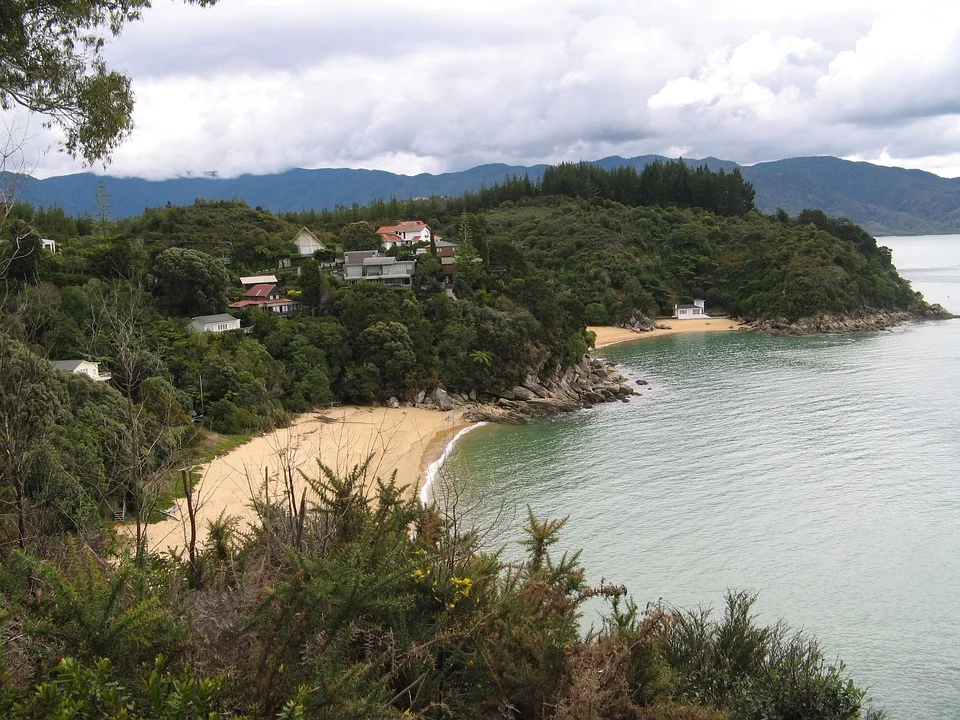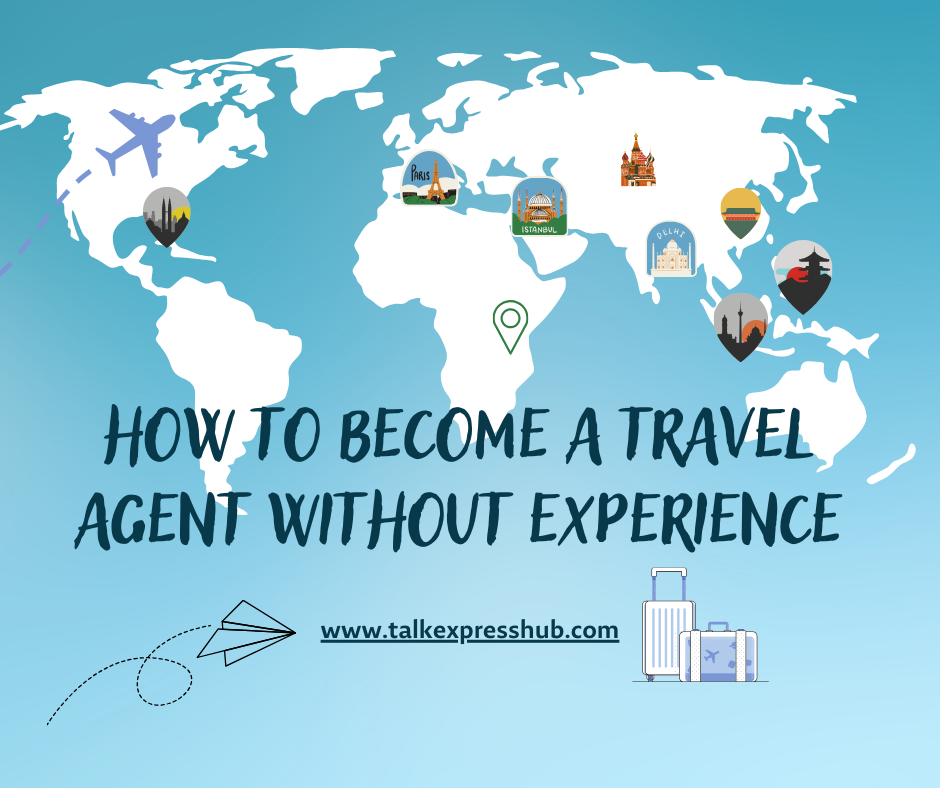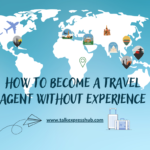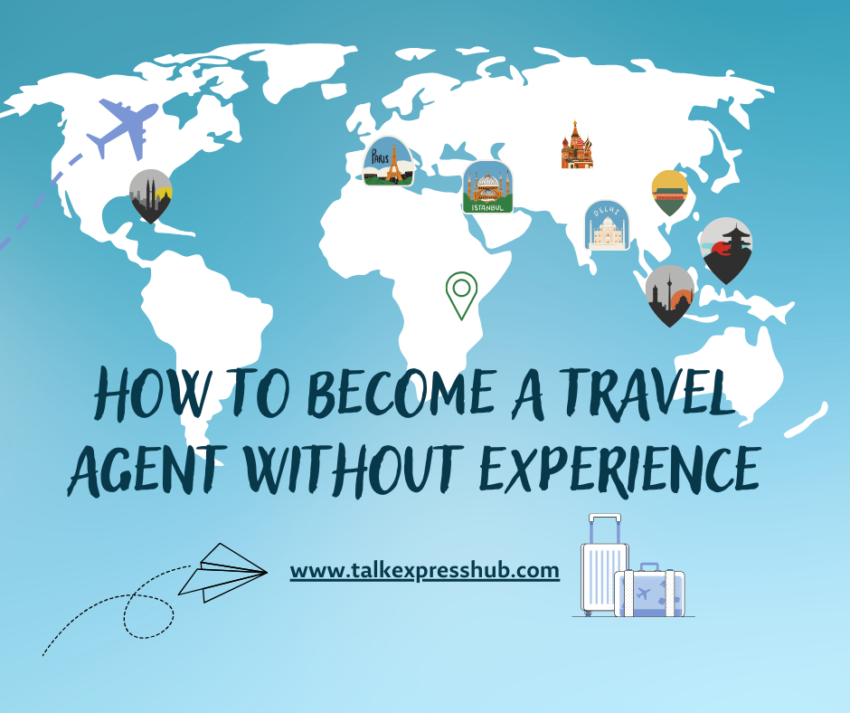Introduction
Becoming a travel agent without prior experience may seem daunting, but with the right approach and dedication, it’s entirely achievable. In this comprehensive guide, we’ll explore the steps you need to take to break into the travel industry and embark on a rewarding career as a travel agent. From gaining knowledge and certifications to practical tips for success, this guide covers it all.
Understanding the Travel Industry

Before diving into the specifics of becoming a travel agent, it’s essential to grasp the dynamics of the travel industry. From trends and popular destinations to the diverse needs of travelers, understanding the landscape will set you on the path to success. Become a Travel Agent Without Experience.
How to Research the travel Industry

Become a Travel Agent Without Experience
To research the travel industry effectively, follow these steps:
- Identify Key Players: Start by identifying major players in the travel industry, including airlines, hotels, travel agencies, and online booking platforms.
- Study Market Trends: Analyze industry reports, market research, and news articles to understand current trends shaping the travel industry. Look for insights on emerging destinations, travel preferences, and consumer behavior.
- Explore Popular Destinations: Research popular travel destinations globally and regionally. Pay attention to factors such as seasonality, cultural events, and attractions that draw travelers to these destinations.
- Understand Target Demographics: Study the demographics of travelers, including age groups, income levels, and travel preferences. This information will help you tailor your services to specific market segments.
- Analyze Competitors: Examine the strategies and offerings of competitors in the travel industry. Distinguish holes on the lookout or regions where you can separate your administrations.
- Utilize Online Resources: Take advantage of online resources such as travel blogs, forums, and social media platforms to gather insights from fellow travelers and industry professionals.
- Attend Industry Events: Participate in trade shows, conferences, and networking events related to the travel industry. These events provide valuable opportunities to learn from experts and connect with potential partners.
- Stay Updated: Continuously monitor industry news and updates to stay informed about changes and developments in the travel industry. Subscribe to newsletters, follow industry publications, and join relevant online communities.\
By following these steps, you can conduct thorough research on the travel industry and gain valuable insights to inform your decisions and strategies. Become a Travel Agent Without Experience.
Exploring Travel Trends and Destinations


To excel as a travel agent, you must stay abreast of the latest travel trends and popular destinations. Whether it’s eco-friendly travel, wellness retreats, or off-the-beaten-path adventures, knowing what’s in demand will help you tailor your services to meet travelers’ needs. Become a Travel Agent Without Experience.
How to Exploring Travel Trends and Destinations

Exploring travel trends and destinations is essential for staying informed and offering relevant services as a travel agent. Here’s how you can effectively explore these aspects:
- Monitor Industry Reports: Keep an eye on industry reports and research studies that highlight current travel trends. These reports often provide valuable insights into emerging destinations, popular activities, and changing traveler preferences.
- Follow Travel Influencers: Follow travel influencers and bloggers on social media platforms like Instagram, YouTube, and Twitter. These influencers often showcase trending destinations and activities, giving you a glimpse into what travelers are interested in.
- Use Travel Aggregator Websites: Explore travel aggregator websites and platforms like TripAdvisor, Expedia, and Skyscanner. These platforms not only allow you to search for flights, accommodations, and activities but also provide valuable data on popular destinations and trending travel experiences.
- Analyze Social Media Trends: Monitor hashtags and discussions on social media platforms to identify trending destinations and activities. Platforms like Instagram and TikTok are particularly popular for sharing travel experiences and discovering new destinations.
- Attend Travel Events and Conferences: Participate in travel events, conferences, and trade shows where industry professionals gather to discuss trends and innovations in the travel sector. These events provide excellent networking opportunities and firsthand insights into emerging travel trends.
- Leverage Google Trends: Use Google Trends to track the popularity of travel-related keywords and destinations over time. This tool can help you identify seasonal trends, regional preferences, and rising destinations.
- Stay Informed About Sustainable Travel: With increasing awareness of sustainability and eco-conscious travel, staying informed about sustainable travel practices and destinations is crucial. Keep an eye on initiatives, certifications, and destinations that prioritize sustainability.
- Explore Niche Travel Markets: Consider exploring niche travel markets such as wellness travel, culinary tourism, or adventure travel. These niche markets often have unique trends and destinations that cater to specific interests and preferences.
By actively exploring travel trends and destinations through these methods, you can stay informed and offer valuable insights to your clients as a travel agent. Become a Travel Agent Without Experience.
Identifying Target Audiences
Each explorer is special, with particular inclinations and interests. Understanding the demographics and psychographics of your target audience will enable you to curate personalized travel experiences that resonate with them. Become a Travel Agent Without Experience
How To Identifying Target Audiences

Identifying target travel audiences is essential for tailoring your services and marketing efforts effectively as a travel agent. Here’s how you can do it:
- Market Segmentation: Divide the travel market into segments based on demographics, psychographics, and behavior. Demographic factors include age, income, gender, and family size, while psychographics delve into interests, values, and lifestyle choices.
- Research Existing Clients: Analyze your existing client base to identify common characteristics and preferences. Look for patterns in their travel habits, such as preferred destinations, travel styles, and budget considerations.
- Conduct Surveys and Interviews: Gather feedback from past clients and potential customers through surveys and interviews. Ask questions about their travel preferences, motivations, and pain points to better understand their needs and desires.
- Utilize Social Media Insights: Leverage social media platforms to gain insights into your target audience’s interests and behaviors. Analyze engagement metrics, such as likes, comments, and shares, to identify topics and destinations that resonate with them.
- Monitor Online Forums and Communities: Participate in online forums and communities where travelers gather to exchange tips, recommendations, and experiences. Pay attention to discussions and common questions to glean insights into their preferences and concerns.
- Consider Travel Intent: Differentiate between various types of travelers based on their travel intent. Some may be leisure travelers seeking relaxation and adventure, while others may be business travelers looking for convenience and efficiency.
- Identify Pain Points and Preferences: Identify common pain points and preferences among your target audience. For example, families with young children may prioritize family-friendly accommodations and activities, while solo travelers may seek immersive cultural experiences.
- Stay Updated on Industry Trends: Keep abreast of industry trends and developments that may impact your target audience’s travel decisions. Factors such as emerging destinations, travel restrictions, and sustainability concerns can influence their choices.
By identifying your target travel audiences through thorough research and analysis, you can tailor your services and marketing strategies to meet their specific needs and preferences effectively. Become a Travel Agent Without Experience.
Gaining Knowledge and Skills


While prior experience isn’t mandatory, acquiring knowledge and honing relevant skills are essential steps in your journey to becoming a successful travel agent. Become a Travel Agent Without Experience.
How To Gaining Knowledge and Skills

Become a Travel Agent Without Experience
Gaining knowledge and skills is essential for success as a travel agent, even without prior experience. Here’s how you can acquire the necessary expertise:
- Take Online Courses: Enroll in online courses that cover essential topics such as travel planning, customer service, and destination knowledge. Platforms like Coursera, Udemy, and LinkedIn Learning offer a wide range of courses tailored to the travel industry.
- Obtain Certifications: Consider obtaining relevant certifications to enhance your credibility and expertise as a travel agent. The Travel Institute offers certifications such as the Travel Agent Proficiency (TAP) Test, which validates your knowledge and skills in the field.
- Attend Workshops and Seminars: Participate in workshops, seminars, and webinars conducted by industry experts to gain practical insights and stay updated on industry trends. These occasions give significant systems administration amazing open doors and active opportunities for growth.
- Volunteer or Intern: Seek opportunities to gain hands-on experience by volunteering or interning at travel agencies, tour companies, or hospitality establishments. This practical experience will deepen your understanding of the industry and build your skill set.
- Read Industry Publications: Stay informed about the latest developments in the travel industry by reading industry publications, travel magazines, and online blogs. This will help you stay updated on trends, destination updates, and industry best practices.
- Shadow Experienced Professionals: Shadow experienced travel agents or professionals in the field to learn from their expertise and observe their day-to-day operations. Ask questions, seek feedback, and absorb as much knowledge as possible during the shadowing experience.
- Utilize Online Resources: Take advantage of online resources such as forums, discussion boards, and social media groups dedicated to the travel industry. Engage with fellow professionals, ask for advice, and share your experiences to learn from others in the community.
- Continuous Learning and Development: Embrace a mindset of continuous learning and development by seeking opportunities to expand your knowledge and skills. Stay curious, explore new destinations, and challenge yourself to grow professionally in the dynamic travel industry.
By actively pursuing opportunities to gain knowledge and skills through education, training, and hands-on experience, you can build a strong foundation for success as a travel agent, even without prior industry experience. Become a Travel Agent Without Experience.
Taking Online Courses and Certifications


Online courses and certifications in travel planning, customer service, and destination knowledge provide a solid foundation for aspiring travel agents. Look for reputable platforms offering comprehensive programs tailored to the travel industry. Become a Travel Agent Without Experience.
How To Taking Online Courses and Certifications

Taking online courses and certifications is a convenient and effective way to gain knowledge and expertise as a travel agent.
- Research Course Options: Start by researching online courses and certifications that are relevant to the travel industry. Look for reputable platforms like Coursera, Udemy, and LinkedIn Learning that offer comprehensive programs tailored to travel planning, customer service, and destination knowledge.
- Choose Relevant Topics: Select courses that cover topics essential to your role as a travel agent, such as travel planning fundamentals, customer relationship management, and destination marketing. Consider your strengths and areas for improvement when choosing courses.
- Read Reviews and Ratings: Before enrolling in a course, read reviews and ratings from past participants to gauge the quality and effectiveness of the content. Look for courses with positive feedback and high ratings to ensure a valuable learning experience.
- Check Course Syllabus: Review the course syllabus and curriculum to ensure it aligns with your learning goals and objectives. Pay attention to the topics covered, learning outcomes, and any prerequisites or requirements for enrollment.
- Enroll in Certified Programs: Consider enrolling in certified programs offered by reputable organizations such as The Travel Institute. These certifications, such as the Travel Agent Proficiency (TAP) Test, provide formal recognition of your knowledge and skills in the travel industry.
- Set a Learning Schedule: Create a learning schedule that fits your lifestyle and commitments, allowing time for studying, completing assignments, and taking assessments. Pace yourself accordingly to ensure you absorb the material effectively.
- Engage Actively in Learning: Actively engage in the course materials by participating in discussions, completing assignments, and seeking clarification on concepts you find challenging. Take advantage of interactive features like quizzes, case studies, and group projects to reinforce your learning.
- Seek Additional Resources: Supplement your online courses with additional resources such as textbooks, articles, and industry publications to deepen your understanding of key concepts. Explore online forums and communities to connect with fellow learners and exchange insights and experiences.
- Track Your Progress: Monitor your progress throughout the course by tracking your completion of modules, assignments, and assessments. Review your performance regularly and address any areas where you may need additional study or practice.
- Earn Certifications: Upon completing your online courses and passing any assessments or exams, obtain certifications to validate your knowledge and skills as a travel agent. Display your certifications proudly on your resume and professional profiles to showcase your expertise to potential clients and employers.
By taking online courses and certifications, you can acquire the knowledge and skills needed to excel as a travel agent, setting yourself up for success in the dynamic and rewarding travel industry. Become a Travel Agent Without Experience.
Hands-On Experience through Internships or Volunteering



Internships or volunteer opportunities at travel agencies or tour companies offer invaluable hands-on experience. Whether it’s assisting with bookings, itinerary planning, or customer inquiries, immersing yourself in the day-to-day operations will deepen your understanding of the industry. Become a Travel Agent Without Experience.
How To Hands-On Experience through Internships or Volunteering

Become a Travel Agent Without Experience
Gaining hands-on experience through internships or volunteering is invaluable for aspiring travel agents.
- Research Opportunities: Start by researching internships or volunteer programs offered by travel agencies, tour operators, and hospitality organizations. Look for opportunities that align with your interests and career goals.
- Check Company Websites: Visit the websites of travel companies to explore their internship or volunteer programs. Look for information on eligibility requirements, application procedures, and available positions.
- Reach Out to Contacts: Leverage your network to inquire about internship or volunteer opportunities in the travel industry. Reach out to friends, family members, mentors, or alumni who may have connections or insights to share.
- Attend Career Fairs and Events: Participate in career fairs, industry events, and networking opportunities where travel companies may be recruiting interns or volunteers. Bring copies of your resume and be prepared to discuss your interest in gaining hands-on experience.
- Customize Your Resume and Cover Letter: Tailor your resume and cover letter to highlight relevant skills, experiences, and qualifications for the internship or volunteer position. Emphasize your passion for travel and eagerness to learn and contribute to the organization.
- Prepare for Interviews: If selected for an interview, prepare by researching the company, understanding its mission and values, and practicing common interview questions. Showcase your enthusiasm, adaptability, and willingness to take on new challenges.
- Be Proactive and Professional: Once you secure an internship or volunteer position, approach your responsibilities with professionalism and enthusiasm. Take initiative, ask questions, and seek opportunities to contribute to projects and initiatives within the organization.
- Seek Feedback and Mentorship: Throughout your internship or volunteer experience, seek feedback from supervisors and colleagues to identify areas for growth and improvement. Take advantage of mentorship opportunities to learn from experienced professionals in the field.
- Build Relationships: Cultivate relationships with colleagues, mentors, and industry professionals during your internship or volunteer experience. Networking can open doors to future opportunities and provide valuable insights into the travel industry.
- Reflect and Learn: Take time to reflect on your internship or volunteer experience and identify key lessons learned. Consider how your experiences have contributed to your growth and development as a travel agent.
By gaining hands-on experience through internships or volunteering, you can develop practical skills, expand your professional network, and gain valuable insights into the inner workings of the travel industry, positioning yourself for success in your future career as a travel agent. Become a Travel Agent Without Experience.
Building Your Reputation
Establishing yourself as a reputable and trustworthy travel agent is crucial for attracting clients and fostering long-term success in the industry. Become a Travel Agent Without Experience.
How To Building Your Reputation

Building your reputation as a travel agent is crucial for attracting clients and fostering trust in your services. Here’s how you can build and maintain a strong reputation in the travel industry:
- Deliver Exceptional Customer Service: Prioritize customer satisfaction by providing personalized service, prompt responses to inquiries, and attention to detail in every interaction. Aim to exceed your clients’ expectations and go the extra mile to ensure their travel experiences are seamless and memorable.
- Focus on Quality Over Quantity: Instead of chasing volume, focus on delivering high-quality service to each client. By prioritizing quality over quantity, you can build a reputation for reliability, expertise, and customer satisfaction.
- Build Relationships with Clients: Cultivate meaningful relationships with your clients by taking the time to understand their preferences, interests, and travel goals. Tailor your recommendations and offerings to meet their unique needs and preferences, fostering loyalty and repeat business.
- Seek Feedback and Reviews: Encourage clients to provide feedback on their experiences and leave reviews on platforms like Google, Yelp, and TripAdvisor. Positive reviews and testimonials serve as social proof of your credibility and expertise, helping to attract new clients.
- Showcase Your Expertise: Position yourself as an expert in the travel industry by sharing valuable insights, tips, and recommendations through blog posts, social media posts, and newsletters. Demonstrate your knowledge of destinations, travel trends, and insider tips to establish credibility with potential clients.
- Be Transparent and Honest: Build trust with your clients by being transparent and honest in your communications. Clearly communicate pricing, policies, and any potential risks or limitations associated with travel arrangements, ensuring clients feel confident in their decision to book with you.
- Stay Responsive and Accessible: Be readily available to assist clients and address their concerns or inquiries in a timely manner. Whether through phone, email, or social media channels, make it easy for clients to reach out to you and receive prompt assistance.
- Invest in Professional Development: Continuously invest in your professional development by staying updated on industry trends, obtaining certifications, and expanding your knowledge of destinations and travel products. Demonstrating a commitment to learning and growth enhances your credibility as a travel agent.
- Go Above and Beyond: Surprise and delight your clients by going above and beyond their expectations. Whether it’s arranging a special surprise for a milestone celebration or resolving a last-minute travel hiccup, demonstrating your dedication to your clients’ satisfaction sets you apart from the competition.
- Request Referrals and Recommendations: Don’t be afraid to ask satisfied clients for referrals and recommendations. Word-of-mouth recommendations from happy clients are one of the most powerful ways to build your reputation and attract new business.
By focusing on delivering exceptional customer service, building relationships with clients, and showcasing your expertise, you can build a strong reputation as a trusted and reliable travel agent in the industry. Become a Travel Agent Without Experience.
Providing Exceptional Customer Service
Delivering exceptional customer service should be at the core of your business ethos. From prompt responses to personalized recommendations, going the extra mile for your clients will set you apart from the competition. Become a Travel Agent Without Experience.
How to Providing Exceptional Customer Service

Giving extraordinary client care is critical to progress as a travel planner. Here are some strategies to ensure you deliver top-notch service to your clients:
- Listen Actively: Take the time to listen attentively to your clients’ needs, preferences, and concerns. Understanding their unique requirements is the first step towards providing personalized and effective service.
- Communicate Clearly: Maintain clear and open communication with your clients throughout the booking process and beyond. Provide detailed information about travel options, pricing, policies, and any potential challenges they may encounter.
- Be Responsive: Respond promptly to client inquiries, whether they come via phone, email, or social media. Aim to address their questions and concerns in a timely manner to demonstrate your commitment to their satisfaction.
- Offer Expert Advice: Leverage your knowledge and expertise to offer valuable advice and recommendations tailored to each client’s preferences and budget. Provide insider tips, local insights, and suggestions for unique experiences to enhance their trip.
- Anticipate Needs: Anticipate your clients’ needs and proactively offer solutions to enhance their travel experience. Whether it’s arranging special accommodations, booking excursions, or providing packing tips, thoughtful gestures can make a big difference.
- Provide Support During Travel: Be available to assist your clients during their travels, especially in case of emergencies or unexpected challenges. Offer 24/7 support and provide clear instructions on how to reach you in case of any issues.
- Handle Complaints Gracefully: Handle client complaints and concerns with professionalism and empathy. Listen to their grievances, apologize for any inconvenience, and work swiftly to resolve the issue to their satisfaction.
- Follow Up After Travel: Follow up with clients after their trip to gather feedback and ensure their satisfaction. Thank them for choosing your services and inquire about their experiences to identify areas for improvement.
- Build Long-Term Relationships: Focus on building long-term relationships with your clients based on trust, reliability, and exceptional service. Stay in touch with them regularly, offer loyalty incentives, and remember special occasions to show that you value their business.
- Seek Feedback and Learn: Continuously seek feedback from your clients to gauge their satisfaction and identify areas for improvement. Utilize their contribution to refine your administrations and improve the client experience.
By prioritizing exceptional customer service and going the extra mile to meet your clients’ needs, you can differentiate yourself as a travel agent and build a loyal client base that trusts and values your expertise. Become a Travel Agent Without Experience.
Leveraging Networking Opportunities
Networking with fellow travel professionals, industry experts, and potential clients is key to expanding your reach and building valuable connections. Attend industry events, join online forums, and engage with travel communities to broaden your network. Become a Travel Agent Without Experience.
How to Leveraging Networking Opportunities

Leveraging networking opportunities is crucial for success as a travel agent. Here’s how you can effectively leverage networking opportunities:
- Attend Industry Events: Make it a point to attend travel industry events, conferences, and trade shows. These gatherings provide valuable opportunities to connect with fellow professionals, suppliers, and potential clients.
- Join Professional Associations: Become a member of professional associations relevant to the travel industry, such as the American Society of Travel Advisors (ASTA) or the International Air Transport Association (IATA). Membership in these associations offers networking events, educational resources, and industry insights.
- Utilize Social Media: Engage with other travel professionals, influencers, and potential clients on social media platforms like LinkedIn, Twitter, and Facebook. Join industry groups, participate in discussions, and share relevant content to expand your network and showcase your expertise.
- Attend Local Networking Events: Look for local networking events, meetups, and workshops focused on the travel industry. These events provide opportunities to connect with professionals in your area and establish valuable relationships.
- Host Your Own Events: Consider hosting networking events, webinars, or workshops to bring together clients, prospects, and industry contacts. Hosting your own events allows you to showcase your expertise, provide value to attendees, and grow your network.
- Offer Value to Others: Focus on building genuine relationships by offering value to others. Listen actively, provide insights and resources, and offer assistance or referrals whenever possible. Building goodwill can lead to mutually beneficial partnerships in the future.
- Follow Up: After networking events or meetings, follow up promptly with new contacts to express appreciation for the connection and continue the conversation. Personalized follow-up emails or messages demonstrate your interest in building a meaningful relationship.
- Stay Active Online: Maintain a consistent presence on social media by sharing valuable content, engaging with others’ posts, and participating in relevant discussions. Active participation helps you stay visible and establish yourself as a knowledgeable and engaged member of the travel community.
- Seek Mentorship: Seek mentorship from experienced professionals in the travel industry who can offer guidance and support as you navigate your career. Mentorship relationships provide valuable insights and help you overcome challenges more effectively.
- Attend Supplier Events: Take advantage of supplier events, such as fam trips and supplier showcases, to network with key suppliers and learn about new destinations and travel products. Building relationships with suppliers can lead to valuable partnerships and insider knowledge.
By actively leveraging networking opportunities, both online and offline, you can expand your professional network, gain valuable insights, and position yourself for success in the competitive travel industry. Become a Travel Agent Without Experience.
Launching Your Career
Armed with knowledge, skills, and a passion for travel, it’s time to take the leap and launch your career as a travel agent. Become a Travel Agent Without Experience.
How to Launching Your Career

Launching your career as a travel agent requires careful planning, dedication, and a strategic approach. Here’s how you can kick-start your journey in the travel industry:
- Set Clear Goals: Define your career objectives and aspirations in the travel industry. Determine whether you want to specialize in a particular niche, such as luxury travel, adventure tourism, or corporate travel management.
- Gain Relevant Education and Training: Acquire the necessary knowledge and skills by pursuing relevant education and training. Consider enrolling in travel and tourism courses, obtaining certifications from reputable organizations like The Travel Institute, and participating in industry-specific workshops and seminars.
- Build Industry Knowledge: Stay informed about the latest trends, destinations, and travel products by reading industry publications, following travel blogs and influencers, and attending travel industry events and conferences.
- Gain Practical Experience: Seek opportunities to gain hands-on experience in the travel industry through internships, volunteering, or entry-level positions at travel agencies, tour operators, or hospitality establishments. Practical experience will help you develop essential skills and build your professional network.
- Develop Your Brand: Define your personal brand as a travel agent by highlighting your unique strengths, expertise, and values. Create a professional website, social media profiles, and marketing materials that reflect your brand identity and showcase your services.
- Network and Build Relationships: Network with fellow travel professionals, suppliers, and potential clients to expand your professional network and establish valuable relationships. Attend industry events, join professional associations, and participate in online forums and communities to connect with like-minded individuals.
- Offer Exceptional Customer Service: Prioritize customer satisfaction by providing personalized service, timely responses to inquiries, and expert advice. Focus on building long-term relationships with clients based on trust, reliability, and exceptional service.
- Market Yourself Effectively: Develop a marketing strategy to promote your services and attract clients. Utilize online and offline marketing channels such as social media, email marketing, networking events, and referral programs to reach your target audience and generate leads.
- Stay Flexible and Adaptable: The travel industry is dynamic and constantly evolving, so it’s essential to stay flexible and adaptable to changes. Embrace new technologies, trends, and opportunities that arise and be willing to adjust your strategies as needed.
- Continuously Learn and Grow: Commit to lifelong learning and professional development to stay competitive in the travel industry. Stay updated on industry trends, obtain new certifications, and seek mentorship and guidance from experienced professionals to enhance your skills and expertise.
By following these steps and staying committed to your goals, you can successfully launch your career as a travel agent and embark on a rewarding journey in the vibrant and exciting world of travel. Become a Travel Agent Without Experience.
Starting Your Own Travel Agency
Consider starting your own travel agency to carve out your niche in the market. Whether you specialize in luxury travel, adventure tours, or family vacations, having your own business gives you the freedom to tailor your services to your unique vision. Become a Travel Agent Without Experience.
How to Starting Your Own Travel Agency

Beginning your own travel service can be a thrilling and remunerating adventure. Here is a bit by bit manual for assist you with getting everything rolling:
- Research and Planning: Begin by researching the travel industry, market demand, and potential competitors in your area. Identify your target market, niche specialties, and unique selling points to differentiate your agency.
- Create a Business Plan: Develop a comprehensive business plan outlining your agency’s mission, goals, target market, marketing strategy, pricing structure, and financial projections.A thoroughly examined field-tested strategy will act as a guide for your office’s prosperity.
- Obtain Necessary Licenses and Permits: Check the legal requirements for starting a travel agency in your jurisdiction. Obtain any required licenses, permits, or certifications, such as seller of travel licenses or accreditation from industry associations like ASTA or IATA.
- Choose a Business Structure: Decide on the legal structure of your travel agency, such as a sole proprietorship, partnership, corporation, or LLC. Talk with a lawful or monetary counselor to decide the best construction for your business.
- Secure Funding: Determine how much capital you’ll need to start and operate your travel agency. Explore financing options such as personal savings, bank loans, investors, or crowdfunding to secure the necessary funding.
- Select a Location: Choose a suitable location for your travel agency that is easily accessible to your target market. Consider factors such as foot traffic, visibility, and proximity to transportation hubs or tourist attractions.
- Build Relationships with Suppliers: Establish partnerships with airlines, hotels, cruise lines, tour operators, and other travel suppliers to access exclusive deals and discounts for your clients. Building strong relationships with suppliers is essential for offering competitive packages and maximizing profitability.
- Develop Your Brand: Create a compelling brand identity for your travel agency, including a memorable name, logo, and visual identity. Clearly communicate your agency’s values, services, and unique selling points to attract clients and build brand loyalty.
- Market Your Agency: Implement a comprehensive marketing strategy to promote your travel agency and attract clients. Utilize a mix of online and offline marketing channels, such as social media, email marketing, advertising, networking events, and partnerships with local businesses.
- Offer Exceptional Customer Service: Provide personalized service, expert advice, and exceptional customer service to differentiate your agency from competitors. Focus on building long-term relationships with clients based on trust, reliability, and satisfaction.
- Launch Your Agency: Once everything is in place, officially launch your travel agency and start promoting your services to potential clients. Host a launch event, announce your opening through press releases or social media, and leverage your network to spread the word about your new venture.
- Continuously Improve and Adapt: Stay informed about industry trends, listen to feedback from clients, and continuously seek ways to improve and adapt your services. Embrace new technologies, marketing strategies, and opportunities for growth to ensure the long-term success of your travel agency.
By following these steps and staying committed to your vision, you can successfully launch and grow your own travel agency and turn your passion for travel into a thriving business. Become a Travel Agent Without Experience.
Embracing Continuous Learning and Adaptation
The travel industry is dynamic and ever-evolving, so it’s essential to embrace continuous learning and adaptation. Stay updated on industry trends, emerging technologies, and shifting consumer preferences to stay ahead of the curve. Become a Travel Agent Without Experience.
How to Embracing Continuous Learning and Adaptation

Embracing continuous learning and adaptation is crucial for success in the ever-evolving travel industry. Here’s how you can make learning and adaptation a priority in your career as a travel agent:
- Stay Informed About Industry Trends: Regularly research and stay up-to-date with the latest trends, developments, and innovations in the travel industry. Follow industry publications, attend webinars, and participate in industry forums to stay informed about emerging trends and best practices.
- Seek Professional Development Opportunities: Take advantage of professional development opportunities to enhance your knowledge and skills as a travel agent. Attend workshops, seminars, and training sessions offered by industry associations, suppliers, and educational institutions.
- Obtain Certifications and Accreditations: Pursue certifications and accreditations relevant to the travel industry, such as those offered by The Travel Institute, ASTA, or IATA. Certifications demonstrate your expertise and commitment to excellence in the field.
- Expand Your Product Knowledge: Continuously expand your knowledge of travel products, destinations, and travel experiences. Familiarize yourself with a wide range of travel options to better serve your clients and tailor recommendations to their preferences.
- Stay Agile and Flexible: Remain adaptable and flexible in response to changing market conditions, customer preferences, and external factors. Be willing to adjust your strategies, offerings, and services to meet the evolving needs of your clients and the industry.
- Embrace Technology: Embrace technology tools and platforms that can streamline your operations, enhance customer experiences, and improve your productivity as a travel agent. Stay informed about new technologies and trends shaping the travel industry, such as mobile booking apps, virtual reality tours, and artificial intelligence.
- Gather Client Feedback: Solicit feedback from your clients about their travel experiences, preferences, and satisfaction with your services. Utilize this criticism to distinguish regions for development and make vital acclimations to upgrade the client experience.
- Network and Collaborate with Peers: Build relationships with other travel professionals and industry peers to exchange insights, ideas, and best practices. Networking with peers allows you to learn from others’ experiences and gain valuable perspectives on industry trends and challenges.
- Monitor Competitors: Keep an eye on your competitors and analyze their strategies, offerings, and customer experiences. Learn from their successes and failures to identify opportunities for innovation and improvement in your own business.
- Stay Curious and Open-Minded: Cultivate a mindset of curiosity and open-mindedness towards learning and growth. Be willing to explore new ideas, experiment with new approaches, and embrace change as opportunities for personal and professional development.
By embracing continuous learning and adaptation, you can stay ahead of the curve in the dynamic and competitive travel industry, enhance your value as a travel agent, and provide exceptional experiences for your clients. Become a Travel Agent Without Experience.
FAQs (Frequently Asked Questions)
Is prior experience necessary to become a travel agent?

While prior experience can be beneficial, it’s not a strict requirement. With dedication, knowledge, and the right skills, anyone can become a successful travel agent.
How long does it take to become a certified travel agent?

The time required to become a certified travel agent varies depending on the training program you choose. Some programs can be completed in a few weeks, while others may take several months to a year.
What skills are essential for a travel agent?

Essential skills for a travel agent include excellent communication, attention to detail, problem-solving abilities, customer service skills, and a passion for travel.
How can I stand out as a travel agent without experience?

To stand out as a travel agent without experience, focus on building strong relationships with clients, providing exceptional customer service, and showcasing your knowledge and expertise in the travel industry.
What are some common mistakes to avoid as a new travel agent?

Common mistakes to avoid as a new travel agent include overpromising and underdelivering, neglecting to stay updated on industry trends, and failing to prioritize customer satisfaction.
Are there any specific niches I should consider as a new travel agent?

Choosing a specific niche, such as adventure travel, luxury vacations, or sustainable tourism, can help you differentiate yourself in the market and attract
Conclusion
Turning into a travel planner without related knowledge is a feasible objective with the right methodology and devotion. By gaining knowledge, honing your skills, building your reputation, and embracing continuous learning, you can embark on a rewarding career in the travel industry. Remember to stay adaptable, customer-focused, and passionate about helping others create unforgettable travel experiences. Become a Travel Agent Without Experience.
More Detail’s > talkexpresshub.com
Please Visit > talkexpresshub.com
Become a Travel Agent Without Experience











